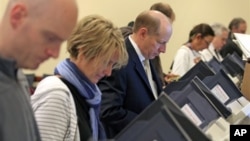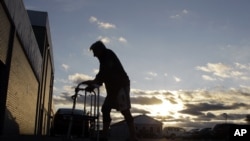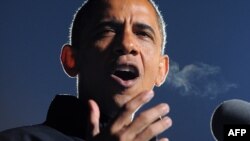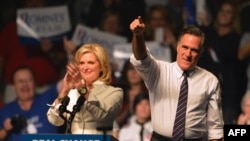American voters are deciding whether to re-elect President Barack Obama or pick a new leader for the next four years, Republican challenger Mitt Romney.
The candidates made a final push for votes Tuesday in what opinion polls say is a tight race.
Voters waited in long lines at polling places throughout the country, with some sporadic problems reported. Both candidates have dispatched lawyers to monitor the voting for any irregularities. The Justice Department has nearly 800 observers at polling places in 23 states to respond to any allegations of fraud.
After a year-and-a-half of campaigning, three debates and thousands of televised campaign ads, nationwide pre-election surveys show the two candidates in a virtual deadlock.
But the surveys also show Obama with a slight edge in a handful of key battleground states that are likely to determine the outcome.
U.S. presidential elections are not decided by the national popular vote, but rather by a two-century-old Electoral College system in which each of the 50 states' influence on the outcome is roughly equivalent to its population.
Each candidate needs at least 270 of the available 538 electoral votes to win the election.
Congressional seats
Voters also are electing all 435 members of the House of Representatives, and 33 of the 100 members of the Senate. Analysts generally say Republicans will continue to hold their majority in the House, while the president's Democratic Party could maintain its slim majority in the Senate.
Millions of Americans already have cast ballots in early voting over the last month.
Obama voted a few days ago in his home city of Chicago, Illinois, and spent Tuesday there. He taped interviews for broadcast in key states and playing basketball with friends, one of his Election Day traditions. Obama also called voters from a campaign office.
Romney, a one-time venture capitalist, voted Tuesday morning in Massachusetts, the northeastern state he once governed, but where Obama is expected to win easily.
Romney then traveled to the closely contested state of Ohio in the central part of the country to visit a campaign office and then flew to neighboring Pennsylvania, a state long-thought to be safely in Obama's grasp, but one where Romney hopes an upset might occur.
Obama's running mate, Vice President Joe Biden, also headed to Cleveland, Ohio, to counter Romney's visit. Romney was joined there by his running mate, Wisconsin Congressman Paul Ryan, who then headed to another battleground state, Virginia.
Last-minute sprint
President Obama and Romney traveled across several key battleground states Monday in a final effort to sway any remaining undecided voters.
Obama made campaign stops in Wisconsin and Ohio, before holding a final rally in Iowa, the state that gave him his first primary victory in his historic 2008 White House campaign. The Democratic incumbent touted his accomplishments during his presidency, including the bailout of the U.S. auto industry and the killing of Osama bin Laden, but said he needed another term to complete his agenda.
"Our fight for change goes on," Obama said. "Because we know this nation cannot succeed without a growing, thriving middle class and sturdy ladders for everybody who's willing to work to get into that middle class. Our fight goes on because America's always done best when everybody's got a fair shot and everybody's doing their fair share, everybody plays by the same rules. The people of Iowa understand that. That's what we believe, that's why you elected me in 2008, and Iowa, that's why I'm running for a second term as president of the United States."
Romney held a rousing late-night rally in New Hampshire, where he launched his campaign more than a year ago, after events in Florida, Virginia and Ohio. The former Massachusetts governor said his record as both a successful businessman and politician shows he, not Obama, would bring about real change for the nation.
"I built a business, I turned around another one, I helped put an Olympics back on track, and with a Democrat legislature, I helped turned my state from deficit to surplus, and from job losses to job growth, and we went from higher taxes to higher take-home pay," noted Romney. "And that's why I'm running for president, because I know how to change the course the nation is on, and I'll do it."
Voters in the small New Hampshire towns of Dixville Notch and Hart's Location cast their ballots at midnight local time (0500 UTC) Tuesday, keeping with tradition in being the first locations in the nation to vote on Election Day. Obama and Romney tied at five votes each in Dixville Notch. In Hart's Location, the president won 23 votes while Romney finished with nine.
The candidates made a final push for votes Tuesday in what opinion polls say is a tight race.
Voters waited in long lines at polling places throughout the country, with some sporadic problems reported. Both candidates have dispatched lawyers to monitor the voting for any irregularities. The Justice Department has nearly 800 observers at polling places in 23 states to respond to any allegations of fraud.
After a year-and-a-half of campaigning, three debates and thousands of televised campaign ads, nationwide pre-election surveys show the two candidates in a virtual deadlock.
But the surveys also show Obama with a slight edge in a handful of key battleground states that are likely to determine the outcome.
U.S. presidential elections are not decided by the national popular vote, but rather by a two-century-old Electoral College system in which each of the 50 states' influence on the outcome is roughly equivalent to its population.
Each candidate needs at least 270 of the available 538 electoral votes to win the election.
Congressional seats
Voters also are electing all 435 members of the House of Representatives, and 33 of the 100 members of the Senate. Analysts generally say Republicans will continue to hold their majority in the House, while the president's Democratic Party could maintain its slim majority in the Senate.
Millions of Americans already have cast ballots in early voting over the last month.
Obama voted a few days ago in his home city of Chicago, Illinois, and spent Tuesday there. He taped interviews for broadcast in key states and playing basketball with friends, one of his Election Day traditions. Obama also called voters from a campaign office.
Romney, a one-time venture capitalist, voted Tuesday morning in Massachusetts, the northeastern state he once governed, but where Obama is expected to win easily.
Romney then traveled to the closely contested state of Ohio in the central part of the country to visit a campaign office and then flew to neighboring Pennsylvania, a state long-thought to be safely in Obama's grasp, but one where Romney hopes an upset might occur.
Obama's running mate, Vice President Joe Biden, also headed to Cleveland, Ohio, to counter Romney's visit. Romney was joined there by his running mate, Wisconsin Congressman Paul Ryan, who then headed to another battleground state, Virginia.
Last-minute sprint
President Obama and Romney traveled across several key battleground states Monday in a final effort to sway any remaining undecided voters.
Obama made campaign stops in Wisconsin and Ohio, before holding a final rally in Iowa, the state that gave him his first primary victory in his historic 2008 White House campaign. The Democratic incumbent touted his accomplishments during his presidency, including the bailout of the U.S. auto industry and the killing of Osama bin Laden, but said he needed another term to complete his agenda.
"Our fight for change goes on," Obama said. "Because we know this nation cannot succeed without a growing, thriving middle class and sturdy ladders for everybody who's willing to work to get into that middle class. Our fight goes on because America's always done best when everybody's got a fair shot and everybody's doing their fair share, everybody plays by the same rules. The people of Iowa understand that. That's what we believe, that's why you elected me in 2008, and Iowa, that's why I'm running for a second term as president of the United States."
Romney held a rousing late-night rally in New Hampshire, where he launched his campaign more than a year ago, after events in Florida, Virginia and Ohio. The former Massachusetts governor said his record as both a successful businessman and politician shows he, not Obama, would bring about real change for the nation.
"I built a business, I turned around another one, I helped put an Olympics back on track, and with a Democrat legislature, I helped turned my state from deficit to surplus, and from job losses to job growth, and we went from higher taxes to higher take-home pay," noted Romney. "And that's why I'm running for president, because I know how to change the course the nation is on, and I'll do it."
Voters in the small New Hampshire towns of Dixville Notch and Hart's Location cast their ballots at midnight local time (0500 UTC) Tuesday, keeping with tradition in being the first locations in the nation to vote on Election Day. Obama and Romney tied at five votes each in Dixville Notch. In Hart's Location, the president won 23 votes while Romney finished with nine.








